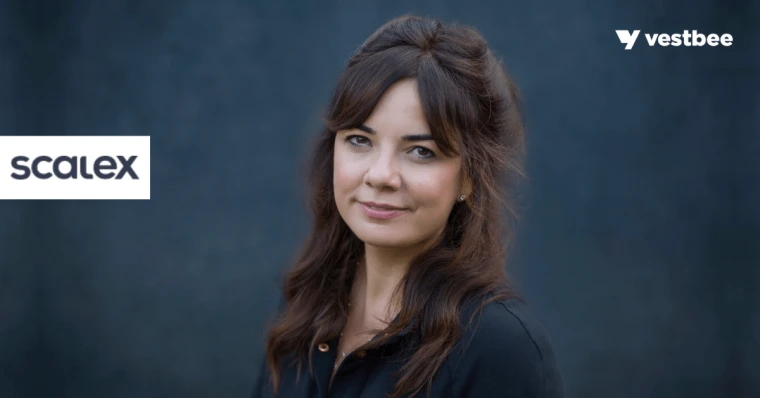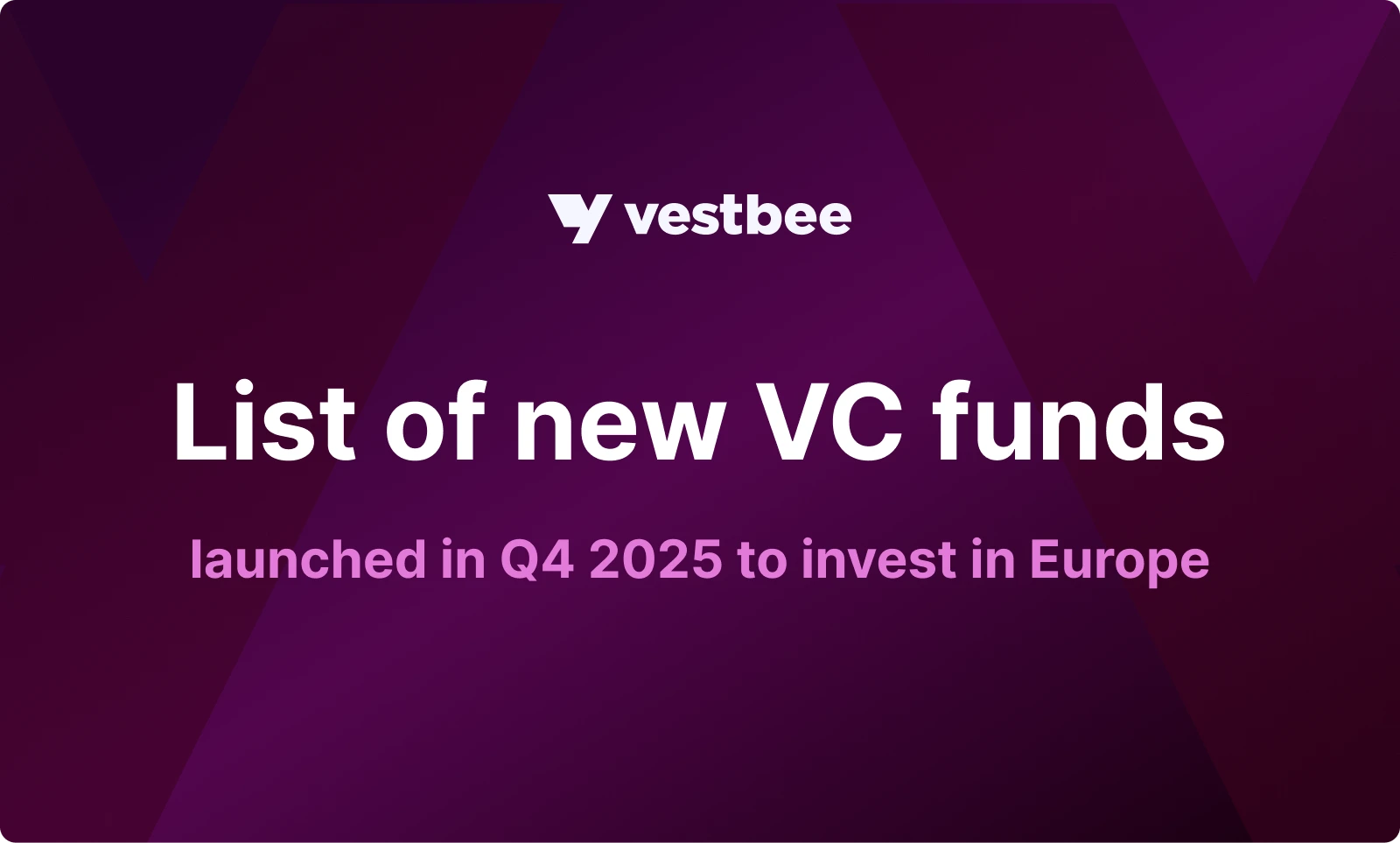ScaleX is an early-stage tech investment firm out of Turkey, investing in enterprise and deep-tech companies. The firm writes initial cheques of between 300k and 3M EUR, and says it is on the hunt for startups developing novel technologies at the cutting edge of their respective sectors. Founded by former operators and founders Dilek Dayınlarlı and Berkay Mollamustafaoglu, ScaleX Ventures is an operator VC that is bringing real tangible value to its portfolio companies by connecting them to the right advisors and experts.
Fund Strategy Overview
Geography: CEE + Turkey
Preferred industries: Sector agnostic, but more comfortable with B2B SaaS and Enterprise Software
Investment ticket: €300K to €3M
Company stage: Seed to Series A
Product type: Software and the product must have a tech angle
Product stage: Beyond MVP
Revenues: Some initial traction is preferred
Q&A with Dilek Dayinlarli, Managing Partner
What are the 5 main things you look for in a startup?
At early-stage investment, there are five main questions we ask ourselves while evaluating startups:
- Why this team? Many global investors like us state that the founding team is the most important issue that affects their investment decision. There is also a lot of academic research supporting this priority. That's why we ask ourselves if the team has the right skills, motivation and experience to achieve global success.
- Why now? This is one of the most important questions to be answered in any investment thesis. Timing is critical in an industry where knowledge is limited. It is very important how well the relevant product or service fits the current dynamics of the market, and how long it will fit in the upcoming period.
- Is there a long-term competitive advantage? We are looking for startups that can protect themselves against competitors over time and have a sustainable competitive advantage.
- What is the market telling us? It is obvious how important the market size and growth rate are for the investor. We prefer to analyze the market data at a detailed level and support our decision with the insights we obtain.
- How can we support the startup? As a team, we contribute to portfolio companies to remove the obstacles to the global success of the venture in which we invest. Therefore, the share of our contribution to the venture is another qualitative factor that affects our investment decision.
What disqualifies a startup as your potential investment target?
We are not a regular VC fund, we not only invest financially but also operationally. We look for dreamers with strong execution capability. There can be a lot of things that are deal-breakers for us but the most important ones are team-related red flags such as lack of dedication from the core team members side, team dynamics, and clarity - that approach successfully discourages us from moving forward. At the end of the day, we can target hundreds of companies and invest one in a hundred.
What in your opinion differentiates the best founders from the rest?
As a result of our observations for a long time, we realized that the most outstanding characteristic of the best founders is execution and agility to learn fast. What we understand as an execution is not just running straight towards the goal with great ambition, it is to make plans on the way, to set goals in every step, be receptive to feedback while experiencing failures and then be able to recover quickly.
This is one of the questions we get asked a lot, but there is not a single personality profile for an entrepreneur to be successful. However, there are some characteristics that successful entrepreneurs share in common. To name a few, the first ones that come to mind are pattern recognition, team building, adaptation and persistence. Also, it is wrong to think that all of these are inborn characteristics - some people are more inclined to perform these behaviors and some can acquire these habits with proper training and development.
Along with these traits, an entrepreneur should possess some essential skills. Especially in the earliest stages of launching a business, startup founders must master time management, data-driven decision-making, strategic thinking, and resilience. Moreover, a successful entrepreneur should not stand still, but evolve with time by constantly learning. Actually, I counted a lot of things, but when I think about it now, it is perhaps the most crucial thing to evolve and try to improve oneself continuously in the long run.
Also, Adam Grant’s last book Think Again has great insights into the profile of the successful entrepreneur. It’s so important to think like a scientist - when you think like a scientist, "you favor humility over pride and curiosity over conviction”. You look for reasons why you might be wrong, not just reasons why you must be right. It's a mindset that can be particularly valuable for entrepreneurs. One Italian study taught budding business owners to view their plans as hypotheses for testing. Compared to a control group, "those entrepreneurs that we taught to think like scientists brought in more than 40 times the revenue of the control group," (40 times!).
What startups should take into account before making a deal with a VC fund?
For our generation Voltron means a lot - it features a team of five space explorers who pilot a giant Super Robot known as "Voltron". The startup team is also similar, you should create your own “Voltron”- a super team with different capabilities. You should look for what superpowers are in the team and how you can make use of them. VC is also an addition to the team - you can definitely look for resources and money they can provide, curtain relationship and network or strategic thinking or maybe access to talent pool, all depends on what you need.
Startups should select a VC who will be with them throughout their long-lasting journey. Just as VCs choose companies to invest in, startups should look at how much the VC will benefit the company, whether it has a strong network, and how far it can take it in the next round of investment like access to potential investors. These are the details that startups should take into account in order to have a strong relationship in a long-run partnership.
What is your approach to startup valuation and preferable share in the company?
Valuation and preferable share amount depend on so many different variables. We always try to come to terms with the entrepreneur at these points throughout the investment process. We generally prefer to lead the rounds, but we are also comfortable with co-investments. Our team usually aims to have at least 10% in the rounds we lead, the biggest reason for this is that we are an operational VC. As we roll up our sleeves and help the companies we invest in, we prefer to sit at the table as true companions.
In terms of company valuation and investment amount, we proceed by taking into account the needs of the company and sector benchmarks. It is actually our duty to protect the motivation and rights of the founders. Their happiness and dedication is critical to us, as the team is what drives an early-stage company to success.
How do you support your portfolio companies?
We are operating purely as a value-add VC fund. We all know how much of a buzzword this term has become lately, but we, as the ScaleX team, try to fulfill this promise as much as we can. We think about the product and develop it day and night in order to support founders from “0 to 1”. I would like to go into the details of this in a moment, but first, I’ll explain one of our characteristics that distinguishes us the most from other VCs.
As the ScaleX team, we distribute a certain part of the profit we will make, also known as carry, to the founders of the ventures we invest in. First of all, we believe that it’s obvious that any carry at ScaleX will only be a fractional share of our portfolio founders’ cumulative achievements. Although the VC firms have taken a risk and made educated decisions on how their portfolio companies could do, the ScaleX team believes that they should also admit that eventual success will be granted to entrepreneurs. Therefore, we believe that the entrepreneurs who have taken risks from the beginning and focused on creating great success stories should be rewarded for their risks no matter how the story ends.
On the other hand, we are really aiming here to create a friendly atmosphere, where all of our founders will be backing each other and share their learnings to improve the fund’s overall success - as a community. This dynamic will actually work in two ways. Essentially, it will act as a protection for the founders in case of an unexpected failure, and help them sleep better at night, even for just a little. Also, it will encourage them to share their experiences with one another in order to create more success stories and an active community. In summary, the fund’s founders will not be alone on this long journey, but they will become the family members of a collaborative startup network.
As for the value-add side, another important quality differentiating us from other VCs is a structure that knows what the entrepreneur needs and has a command of the expectations of all parties in this ecosystem.
As a team, we put emphasis on what our portfolio companies might need. This focus gives us the opportunity to offer serious operational support to startups. In this context, we guide the way with our experience and knowledge that will help to improve the vision of the entrepreneur in many ways, from marketing to business development, from sales to HR, in line with their needs. Of course, since we don't have expertise in every subject, we have surrounded ourselves with people who have a wide knowledge from various fields, so our startups can benefit from the mentorship of many local and foreign experts.
What are the best-performing companies in your portfolio?
You know, VC is a long-term business. As a fund established at the beginning of 2020, we are just starting. Also, we are talking about a very small pool, as we have made a total of 8 investments. But already some of our companies are starting to show the potential to achieve a lot. For example, Locomation, which has signed commercial contracts with Wilson Logistics and PGT Trucking for a total of more than 2,100 Autonomous Relay Convoy™ (ARC) systems, have already given the signals of being a potential unicorn. Besides, I can say that Code2 and Hipporello also grow their user base very quickly.
What are your notable lessons learned from investments that didn’t work out as expected?
As I said before, we are actually more of a young fund. Therefore, even if we have made an investment that needs to be learned from, we are yet to see the effects of it. I am very pleased with the investments we have made so far and the progress of the fund. However, in my nearly 10-year VC career, of course, I had some lessons learned. Perhaps the most important of these is that distribution beats the product and when the high growth market meets a great team is where the magic happens.
A general trend I see while supporting startups from Turkey or CEE is that they have a competitive product but not enough focus on their go-to-market strategy. No matter how good the product you have, it is very difficult to be successful on a global scale unless you distribute it well. Therefore, we hold meetings with the startups we invest in concentrating on go-to-market strategy bringing the experts of the subject to the table.
What are the hottest markets you currently look at as VC and where do you see the biggest hype?
Covid-19 has accelerated digitalization across all aspects of work and life. Although the exponential growth in technology makes it difficult to make future predictions day by day, we definitely have certain focus areas in which we see the high potential.
When we look at the last period in detail, there is a significant technology adoption gap between the pre-pandemic era and the post-pandemic era regarding daily habits. Remote education, grocery delivery, telehealth, or digital fitness are some areas that have a meteoric rise in adoption and many of those trends are here to stay.
Besides those, with the recent development of fields such as Machine Learning and Artificial Intelligence, "computation" is seen as an important investment area. In addition, as a result of the increase in the digital footprint, we foresee great opportunities in the fields of Enterprise Software and Cyber Security. We expect high volumes of investments to be made in all these areas in the coming period.
Also, the fields of biotechnology and climate change are expected to grow as a reflection of the increasing awareness of nature and the world with the pandemic. These technologies, which are one of the areas that I personally want to invest in too, are very critical for the future of our planet, as they are our most important legacy that we can leave to the next generations.
In your view, what are the key trends that will shape the European VC scene in the coming years?
The US has always been the cradle of investments and investors, but this is changing a bit due to the Covid-19 pandemic and accelerating digitalization. While the US is still a leader in many areas, the number and momentum of startups coming out of Europe is very strong. The biggest trend I see as an investor is that investors in Silicon Valley have turned their attention to Europe. The European startup ecosystem has seen an unprecedented inflow of capital in the past years, and the main reason for this is global investors. I think this trend will continue to increase in the coming period.
Another important trend is the growing size of EU-based funds. Existing funds are raising significantly larger (follow-on) funds, resulting in much larger average fund sizes. In this way, entrepreneurs in Europe will be able to close larger rounds without bringing in US-based investors, and their access to money will be even easier. As of now, the EU is more successful than the US in terms of the ratio of becoming unicorns after receiving Seed investment. Thanks to this trend, I believe that the success rate of EU-based startups will increase even more.
Related Posts:
VC Of The Month - Revo Capital (by Magdalena Balcerzak, Manager, Vestbee)
VC Of The Month - LAUNCHub Ventures (by Magdalena Balcerzak, Manager, Vestbee)
VC Of The Month - Next Road Ventures (by Magdalena Balcerzak, Manager, Vestbee)






